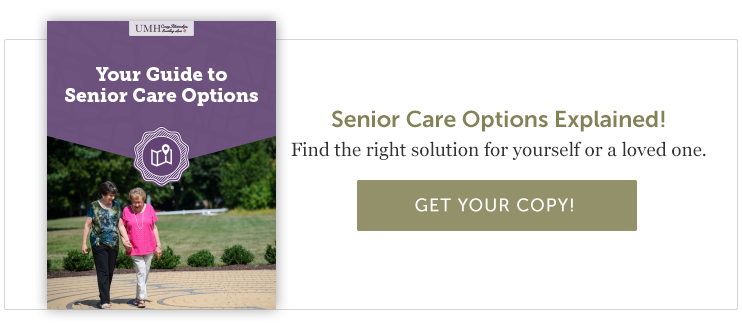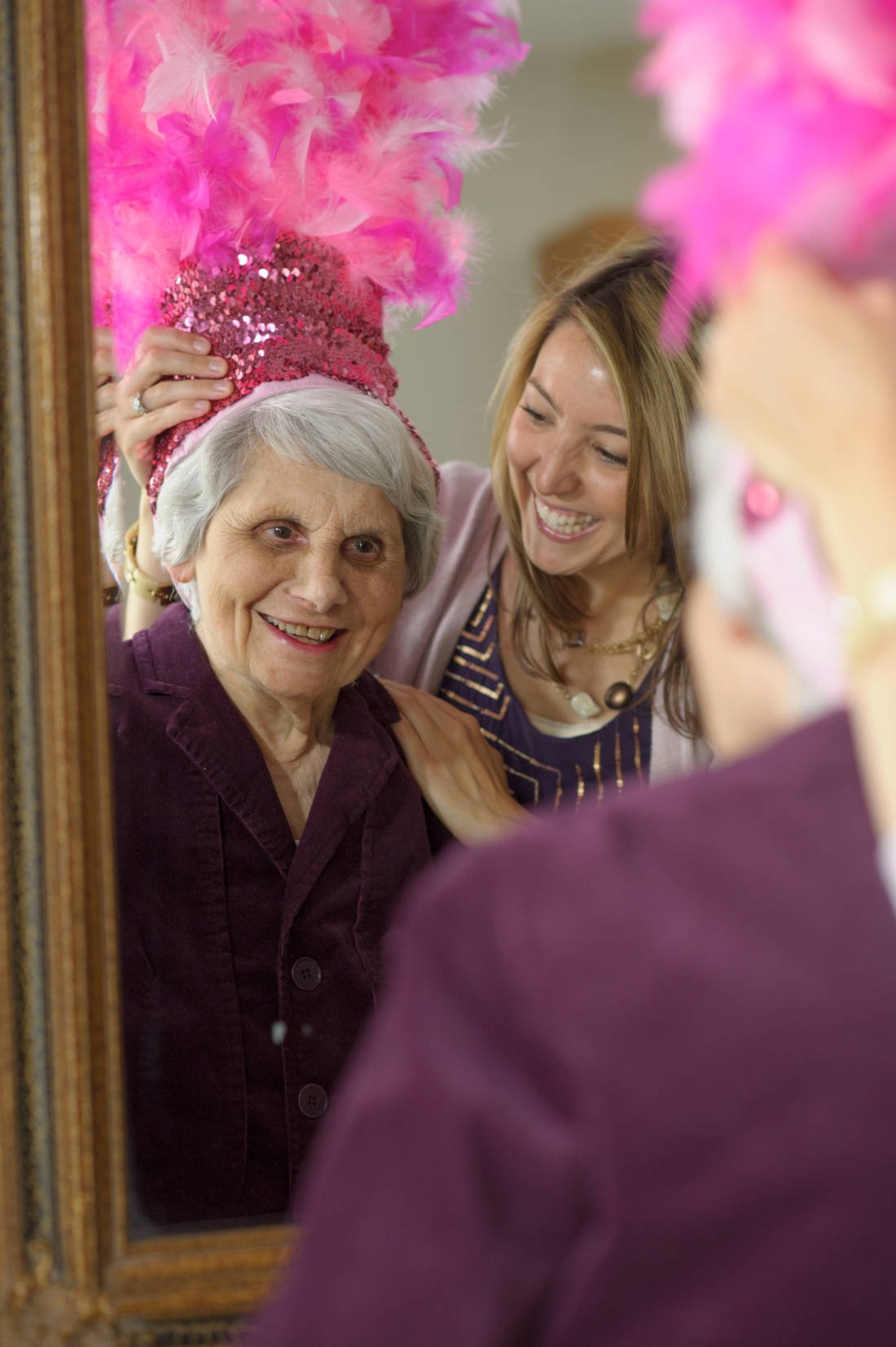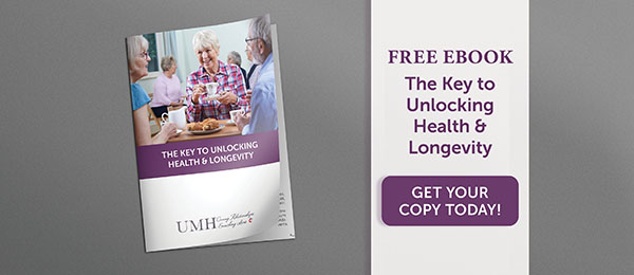The possibility of moving out of one’s home is not always a welcome idea for seniors, but planning for the future or considering the best alternatives for current day-to-day challenges is incredibly important for older adults. While there are plenty of fears and assumptions that may have some seniors overlooking the concept of a senior living community, the truth is there is a host of research that underscores the benefits of this option.
According to the National Institute on Aging, there are a number of factors that influence healthy aging—and while not all of them are within our control (like genetics), many of them can be impacted by the decisions we make. Join us as we explore some of the interesting research supported by NIA and others, which identifies these crucial points of healthy aging. In addition, learn how these elements are well-supported by the benefits of senior living communities.
“Several recent studies show that older adults who are socially isolated or feel lonely are at higher risk for heart disease, depression, and cognitive decline. A 2021 study of more than 11,000 adults older than age 70 found that loneliness was associated with a greater risk of heart disease. Another recent study found that socially isolated older adults experienced more chronic lung conditions and depressive symptoms compared to older adults with social support.”
By boosting interpersonal engagement, interacting with others more regularly, sharing meals and activities, and taking advantage of various human touchpoints, seniors are better positioned to achieve their goals of aging well.
One of the greatest differentiators between seniors living alone and those residing in a senior living community is their access to this kind of social support. Senior living communities offer tangible benefits in the way of social interaction, day-to-day contact, opportunities for relationship-building, and a sense of safety among neighbors and staff.
“Scientific evidence suggests that people who exercise regularly not only live longer, but also may live better — meaning they enjoy more years of life without pain or disability.”
For exercise to become a routine, seniors should be motivated by their surroundings to get up and be active. This is why residents of senior living communities are more likely to fulfill their recommended levels of physical activity. This type of environment naturally encourages proper exercise through access to coordinated classes, equipment, events, and activities, as well as proximity to neighbors and staff who can help motivate and instruct.
“Making smart food choices can help protect you from certain health problems as you age and may even help improve brain function.”
Because nutritional needs and realities evolve with age, it’s important to understand these changes and approach senior nutrition accordingly. From variations in bone mass and muscle to higher risks for developing chronic diseases and health conditions, the aging process requires a particularly strong focus on issues related to the body. Applying a healthy approach to nutrition is fundamental to prioritizing those issues in a way that supports prolonged independence.
But for many seniors, particularly those who live alone, preparing meals for themselves may feel like a lot of work, especially if they must manage health conditions. Issues like diabetes or heart disease require strict diets, and it can be difficult to stay on top of these nutritional requirements.
In a senior living community, seniors have access to prepared meals that meet nutritional and dietary needs, all while providing variety and choice. There’s no pressure to shop for and prepare meals several times a day, multiple days a week—and access to smart food choices is a non-issue.
“A 2021 study found that getting regular check-ups helps doctors catch chronic diseases early and can help patients reduce risk factors for disease, such as high blood pressure and cholesterol levels. People who went to the doctor regularly also reported improved quality of life and feelings of wellness.”
When a senior is no longer able to drive or doesn’t feel comfortable doing so, getting to medical appointments can be a challenge, especially if the schedules of family and friends make it difficult to assist in this area. Many senior living residents appreciate the opportunity to take advantage of transportation services, which offer lifts to medical appointments, among other places.
In a senior community that comprises assisted living, there’s also the added benefit of medical care available seven days a week, typically in the form of on-site nurses. Having nurses on call and nearby to assess an emergent situation is tremendously valuable and can ensure that a senior gets the care they need right away. All of this goes a long way in terms of staying ahead of changes in health and maintaining overall wellness.

“Research shows that constant stress can change the brain, affect memory, and increase the risk of developing Alzheimer’s or related dementias. Older adults are at particular risk for stress and stress-related problems. A recent study examined how levels of the stress hormone cortisol change over time. Researchers have found that cortisol levels in a person’s body increase steadily after middle-age, and that this age-related increase in stress may drive changes in the brain. A meta-analysis funded by the National Institute of Mental Health supports the notion that stress and anxiety rewire the brain in ways that can impact memory, decision-making, and mood.”
With age comes a decreased ability for our brains to regulate hormone levels, making it especially challenging for seniors experiencing immense anxiousness or worry to minimize the physical impacts. These hormones can have detrimental long-term impacts, potentially affecting vital mental health aspects like memory and contributing to depression. Anxiety, depression, and loneliness can cause sleep loss, weight loss, mood swings, and even thoughts of suicide.
Senior living communities support mental health by not only providing a social support system, but also a team of staff who can help recognize symptoms of stress and intervene when necessary. Getting proper professional help when a senior is struggling with mental and emotional challenges that impact everyday life is absolutely essential.
“Research also shows that being socially active can benefit older adults. A study of more than 3,000 older adults found that making new social contacts was associated with improved self-reported physical and psychological well-being.”
When a senior is limited in mobility or otherwise unable (or unwilling) to get out and meet new people, overall health may begin to decline as a result. In a senior living community, however, there are far easier, more prevalent ways to get to know neighbors and make connections on a daily basis.
There’s typically a variety of opportunities to connect with others through coordinated social events. Residents are encouraged to take advantage of regularly scheduled activities and ongoing programs that are designed specifically to educate, inspire and entertain, all with individual interests and the goal of socialization in mind.Ultimately, senior living communities give seniors the opportunity to embrace a more vibrant and less worrisome quality of life so they can experience this part of their journey in the most positive, healthy way possible.To find out how United Methodist Homes provides a wealth of offerings and opportunities to support the health and wellbeing of our residents, contact us today or schedule a complimentary visit now.






